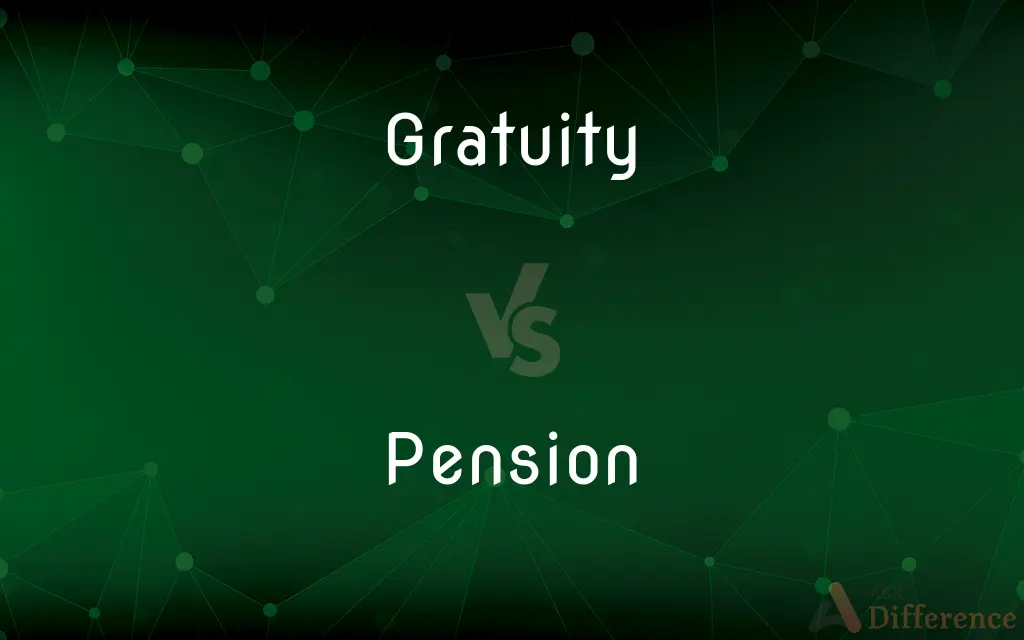Gratuity vs. Pension — What's the Difference?
By Tayyaba Rehman & Urooj Arif — Published on February 29, 2024
Gratuity is a lump-sum payment given to employees as a gesture of gratitude for their service, typically upon retirement, while a pension is a regular payment made during an employee's retirement, derived from their years of service and salary history.

Difference Between Gratuity and Pension
Table of Contents
ADVERTISEMENT
Key Differences
Gratuity and pension are both forms of financial benefits offered to employees, usually upon retirement, but they serve different purposes and are structured differently. Gratuity is a one-time payment made by employers to employees as a token of appreciation for their years of service.
A pension, on the other hand, is a retirement plan that provides regular, often monthly, payments to employees after they retire from active service. Pensions are designed to provide financial security and a steady income stream to retirees, reflecting their service duration and earnings during their employment years.
Gratuity acts as a thank-you note and is paid out once, while pensions are more like a salary continuation into retirement, ensuring the retiree's financial stability. Gratuity payments do not require contributions from the employee and are solely the employer's responsibility, based on predetermined criteria. In contrast, pension benefits are typically accumulated over time, with specific amounts set aside or contributed regularly to a pension fund during the employee's working years.
The eligibility for gratuity and pension also differs; gratuity is usually paid after a minimum period of service, for example, five years, depending on the policy or legal requirements of the country. Pension eligibility, however, is often based on a combination of age and service length, and the amount received can vary significantly based on the pension plan's structure, investment performance, and other factors.
Both gratuity and pension are important components of retirement benefits, but they serve different financial roles for retirees, with gratuity providing a one-time payment as a gesture of goodwill, and pensions offering ongoing financial support throughout retirement.
ADVERTISEMENT
Comparison Chart
Type of Payment
Lump-sum payment
Regular payments (e.g., monthly)
Purpose
Thank employees for their service
Provide steady income post-retirement
Contribution
Employer-funded, no employee contribution
Often requires contributions from both employer and employee
Payment Timing
Typically at retirement or exit
Starts upon retirement and continues regularly
Calculation Basis
Based on years of service and final salary
Based on salary history and years of service
Eligibility
After a minimum period of service (e.g., 5 years)
Based on age and service length
Compare with Definitions
Gratuity
A one-time financial reward for an employee's long-term service, usually given at retirement.
He received a generous gratuity after 30 years with the company.
Pension
A regular payment made to a retired employee, ensuring financial stability.
His monthly pension allows him to maintain a comfortable lifestyle in retirement.
Gratuity
Calculated based on the duration of service and the last drawn salary.
Her gratuity was calculated as 15 days' salary for each year of service.
Pension
Accumulated through contributions over the employment period.
Both she and her employer contributed to the pension fund throughout her career.
Gratuity
Not dependent on employee contributions.
The company provides gratuity regardless of any personal savings or contributions.
Pension
Provides ongoing income post-retirement.
Their pension payments are crucial for their day-to-day expenses.
Gratuity
Paid out upon meeting certain conditions, like a minimum service period.
She became eligible for gratuity after completing five years of service.
Pension
Amount is influenced by salary history and years of service.
The final pension amount reflects his high-ranking position and years of service.
Gratuity
Reflects the employer's gratitude towards the employee.
The gratuity is a token of appreciation for his dedication and hard work.
Pension
Can be government-funded, private, or a combination.
Her pension plan is a mix of government and private fund investments.
Gratuity
A favor or gift, usually in the form of money, given in return for service.
Pension
A sum of money paid regularly as a retirement benefit or by way of patronage.
Gratuity
Euphemistic form of fee, in contexts where such additional payments have been made obligatory.
Pension
An annuity paid regularly as benefit due to a retired employee, serviceman etc. in consideration of past services, originally and chiefly by a government but also by various private pension schemes.
Many old people depend on their pension to pay the bills.
Gratuity
An additional payment given freely as thanks for service.
Pension
A payment; a tribute; something paid or given.
The stomach's pension, and the time's expense.
Gratuity
Something voluntarily given in return for a favor or service, as a recompense or acknowledgment.
Pension
To grant a pension to; to pay a regular stipend to; in consideration of service already performed; - sometimes followed by off; as, to pension off a servant.
One knighted Blackmore, and one pensioned Quarles.
Common Curiosities
How is the gratuity amount calculated?
Gratuity is typically calculated based on the employee's years of service and the salary at the time of retirement or exit, with specific formulas varying by jurisdiction and company policy.
What happens to my pension if I change jobs?
Pension benefits can often be transferred to a new employer's plan, retained in the existing plan until retirement, or rolled over into an individual retirement account, depending on the pension scheme's rules.
Can I receive both gratuity and pension?
Yes, many employees are eligible for both gratuity and pension, provided they meet the criteria set by their employer and pension plan.
Are pension payments adjusted for inflation?
Some pension plans include cost-of-living adjustments (COLAs) to offset inflation, but this feature varies by plan.
Is gratuity paid if an employee resigns?
Gratuity can be paid upon resignation, provided the employee has completed the minimum required period of service as per the policy or legal requirement.
Is gratuity mandatory for all employers?
The requirement to pay gratuity depends on local labor laws and company policies; it's mandatory in many countries for employers after an employee completes a certain period of service.
Can I opt out of a pension plan?
Opting out depends on the pension plan's rules and local laws; some plans, especially mandatory government schemes, may not allow opting out.
Are there taxes on gratuity and pension?
Tax treatment of gratuity and pension income varies by country and can depend on factors like the total amount received and other income sources in retirement.
Can I take a lump-sum payment instead of regular pension payments?
Some pension plans offer the option to take a lump-sum payment upon retirement instead of regular annuity payments, but this can depend on plan rules and individual circumstances.
What is a vested right in the context of gratuity and pension?
A vested right refers to the employee's entitlement to benefits (gratuity or pension) after meeting certain conditions, such as a minimum period of service.
What is the difference between a defined benefit and a defined contribution pension plan?
A defined benefit plan promises a specified monthly benefit at retirement, often based on salary and service years, while a defined contribution plan's retirement benefit depends on contributions and investment returns.
How are pension contributions invested?
Pension contributions are typically invested in a mix of assets, such as stocks, bonds, and real estate, to ensure growth and fund future payouts.
How do economic downturns affect pension plans?
Economic downturns can impact pension fund investments, potentially affecting the benefits paid out to retirees, especially in defined contribution plans.
What determines the amount of pension I will receive?
Pension amounts are generally determined by factors such as the employee's earnings history, years of service, and the age at retirement, along with the specific terms of the pension plan.
Can self-employed individuals receive gratuity or pension?
Self-employed individuals typically don't receive gratuity but can set up individual pension plans or contribute to retirement accounts to ensure income in retirement.
Share Your Discovery

Previous Comparison
FIFO vs. LIFO
Next Comparison
TeamViewer vs. LogMeInAuthor Spotlight
Written by
Tayyaba RehmanTayyaba Rehman is a distinguished writer, currently serving as a primary contributor to askdifference.com. As a researcher in semantics and etymology, Tayyaba's passion for the complexity of languages and their distinctions has found a perfect home on the platform. Tayyaba delves into the intricacies of language, distinguishing between commonly confused words and phrases, thereby providing clarity for readers worldwide.
Co-written by
Urooj ArifUrooj is a skilled content writer at Ask Difference, known for her exceptional ability to simplify complex topics into engaging and informative content. With a passion for research and a flair for clear, concise writing, she consistently delivers articles that resonate with our diverse audience.
















































